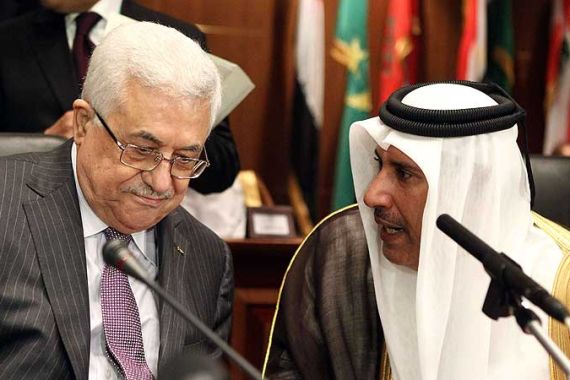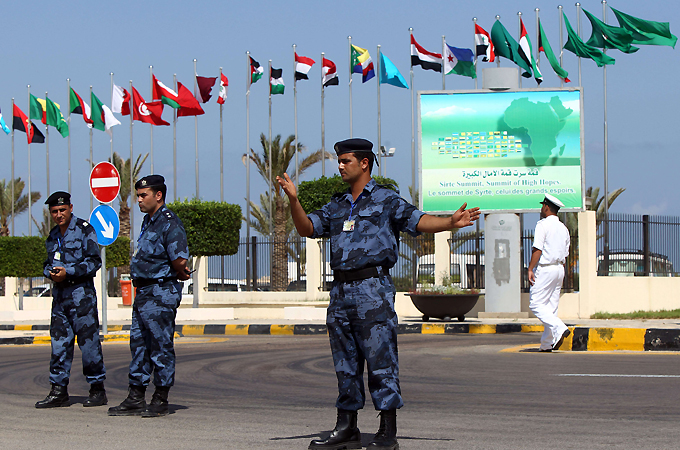Arab leaders weigh peace options
Ministers meeting in Libya give the US another month to try to keep Palestinian-Israel peace talks from collapsing.

 |
|
There are divisions in the Arab League over the peace-process impasse as leaders meet in the Libyan city of Sirte [AFP] |
Arab ministers have agreed to give the US another month to try to keep Israeli-Palestinian peace talks from collapsing.
The decision came on Friday at an Arab League summit in the Libyan city of Sirte. The Arab leaders want the US to persuade Israel to renew a freeze on West Bank settlement construction.
They have supported the Palestinians’ decision to stop direct talks with Israel unless the Israelis agree to halt all settlement construction in the West Bank. The Arab decision represents a compromise as the US struggles to prevent a total collapse of direct negotiations between the two sides that began last month.
Some Arab countries are proposing that Mahmoud Abbas, the Palestinian president, return to indirect negotiations to avoid a total breakdown of Middle East peace.
Al Jazeera’s Hashem Ahelbarra, reporting from Sirte, said there are divisions in the Arab League as to how to proceed. He said that Libya and Syria do not support the resumption of peace talks while Israelis continue to build settlements, but “so-called moderate countries” such as Egypt, Jordan and Saudi Arabia are interested in exploring “different venues”.
Impediment to talks
Amr Moussa, the Arab League secretary-general, has said the Israeli stance is not helping efforts to return to the negotiating table.
Abbas is set to present his case to the Arab League for suspending peace talks.
Nabil Abu Rdainah, a spokesman for Abbas, said the Palestinian leader will tell Arab foreign ministers that “resuming negotiations requires a full freeze of settlement activities” in the occupied West Bank.
| In Depth | |||||||||
|
“Settlement is an impediment to negotiations and creates an atmosphere in which Israel alone is to be blamed for the obstruction of the political process,” he said.
US-sponsored direct peace talks between Israel and the Palestinian Authority, led by Abbas, were relaunched a month ago in Washington, with the declared goal of reaching a two-state solution within a year.
But the talks were thrown into jeopardy in September after Binyamin Netanyahu, the Israeli prime minister, refused to extend a 10-month freeze to the construction of Jewish settlements.
Abbas has said he wants to go on negotiating but cannot unless the new settlement construction is frozen for “three to four months more to give peace a chance”.
But he said he would not make a final decision on the talks until after meeting Arab League ministers.
Abbas has strong backing from the Palestinian leadership and the public to quit the peace talks over the settlement issue, though Washington has urged Arab ministers to back the talks rather than encourage Abbas to pull out.
Ban’s appeal
Ban Ki-moon, the UN secretary-general, has also called on Israeli and Palestinian leaders to sit down together again.
“I urge Israel to restore settlement restraint under its road map obligations and I urge Arab leaders meeting in Sirte this week to keep doors open and support [Palestinian] President Abbas.”
Jewish settlement on occupied Palestinian land is one of the bitterest aspects of the conflict between Israelis and Palestinians.
The Palestinians view the presence of 500,000 Israelis in more than 120 settlements in the occupied West Bank and East Jerusalem as a major threat to the viability of their future state and see the freezing of settlement construction as a key test of Israel’s seriousness about the talks.
Jewish settlements on occupied territory are illegal under international law but have been expanding in the West Bank for 30 years.
